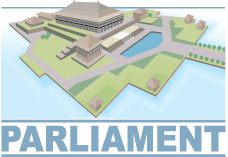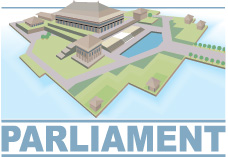Columns
Ranil cheers up Govt. as Speaker claims Parliament is supreme
For another week, Parliament became the battleground where the ongoing fight for supremacy between the Legislature and the Judiciary was played out and this time around the Legislature made its stance clear, more vocally and forcefully.

Speaker Chamal Rajapaksa, for the second time in less than two months, sent a strong rebuff to the judiciary when he declared that the notices served on him and the 11 members of the Parliamentary Select Committee appointed to probe charges against Chief Justice Shirani Bandaranayake were a “nullity and entail no legal consequences”.
“The matters concerned fall within the exclusive domain of Parliament and no intervention in any form by any external agency is consistent with the established principles of law, and is therefore to be rejected unreservedly as an unacceptable erosion of the powers and responsibilities of Parliament,” he ruled.
Along with this declaration on Thursday evening, he also made it clear that his ruling would apply to “any similar purported notice, order or determination in respect of the proceedings of the committee which would continue solely and exclusively under the authority of Parliament.”
The notices were sent last Wednesday by the Court of Appeal, on the direction of the Supreme Court, to the Speaker and to each member of the PSC, following several writ applications filed seeking to end the impeachment proceedings against the Chief Justice.
Prior to the Speaker’s ruling, the matter was brought to the attention of the Chamber by Minister and House Leader Nimal Siripala de Silva, himself is a member of the PSC. He claimed that there was no provision in the Constitution or Standing Orders or any other law in the country to challenge a parliamentary select committee appointed by the Speaker and asked that an order be made regarding the notices that were received.
His comments drewintervention from several members, both from the government and the opposition. Among them was Opposition Leader Ranil Wickremesinghe who said the independence and stature of Parliament had to be protected and no such notices issued by courts should be entertained.
Several MPs including Mr. Wickremesinghe urged the Speaker to refer to the landmark ruling given in June, 2001 by former Speaker, the late Anura Bandaranaike. When faced with a similar situation, Mr. Bandaranaike ruled that the Supreme Court had no jurisdiction to issue interim orders restraining the Speaker of Parliament in respect of the steps he was empowered to take under Standing Order 78 which laid down the procedure for the removal of judges. Such orders were not binding on the Speaker and there were no legal obligations to comply with them.
Speaker Rajapaksa in the course of his ruling made special mention of the views expressed by the Opposition Leader, particularly his contention that “the purported notices constitute an unwarranted interference with the powers and procedures of Parliament, and are invalid”.
This is the second such ruling by the Speaker in less than two months. On October 9, the Speaker, in a lengthy ruling faulted the Supreme Court for sending a copy of a petition filed challenging the constitutionality of the Divi Neguma Bill to the Secretary General of Parliament instead of the Speaker, as required by the Constitution.
On that occasion, the Speaker said that the “the Supreme Court in the determination has erred in reading the unambiguous provisions relating to the Speaker in the Constitution which if allowed to remain in its present form will cause irreparable impairment to procedure and practice of Parliament.”
While the government and opposition seemed somewhat united in safeguarding the rights and privileges of the legislature, during the debate on the votes of the Ministry of Justice last Wednesday, the sharp divergence of opinion on the impeachment proceedings initiated against the chief Justice became blatantly visible.
While many opposition members accused the government of staging a witch-hunt against the Chief Justice, Government members found fault with her conduct which resulted in the present turn of events.
Janatah Vimukthi Peramuna frontliner Vijitha Herath, one of the four opposition MPs in the PSC, said this was a “political impeachment” brought only because the Chief Justice had refused to toe the Government line on several important matters that came up before the courts. “The Government is using its ill-gotten two-thirds majority in Parliament to trample on the independence of the judiciary. The equality before the law that is guaranteed to all citizens by the Constitution does not exist anymore.
Even a judge is entitled to a fair trial, so is an MP and so is every citizen of this country but this right has been denied today,” he said.
The UNP’s Kurunegala District MP, Dayasiri Jayasekera, said the Government had accused the opposition of turning the Chief Justice’s impeachment into a media circus whereas it was the government which was doing so. “Who transported hundreds of people by bus to the vicinity of Parliament when the Divi Neguma Bill was being presented in the House? That was a media circus. The Government’s policy is to hit back at anyone who it cannot control and this is what has happened in the Chief Justice’s case,” he said.
The UPFA’s Sajin Vaas Gunawardena said the proceedings initiated against the Chief Justice were constitutional. “We need to abide by the law. The Chief Justice is not above the law,” he said.
Justice Minister Rauff Hakeem said the contention of some opposition members that the work in the judiciary had come to a standstill due to the impeachment proceedings was incorrect. “The Judicial Services Commission (JSC) and the work of the judiciary are continuing as usual,” he said.
With the Chief Justice scheduled to make her second appearance before the PSC on Tuesday, the final week of debate on the Appropriation Bill is likely to be dominated by the same issue as the first two weeks.
Follow @timesonlinelk
comments powered by Disqus


























